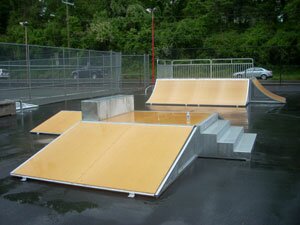ONARCHITECTURE- Family feud: Skaters rejoice, supes kvetch

Financial grind: County officials say they were "surprised" to receive a bill for their half of the $200,000 renovation of the McIntire Skatepark.
PHOTO BY DAVE MCNAIR
When the skateboard park on McIntire Road was abruptly closed and dismantled at the beginning of the year, many assumed it was being scrapped to make way for the proposed 250 Interchange project. C'mmon, would the powers that be do that to us, dude? No way! They were just ordering us some rad new ramps and rails!
To the joy of boarders and bikers, the over $200,000 renovation of the park should be completed this month. The old park, say city officials, was abruptly dismantled over concerns about safety, as the equipment was quickly deteriorating. The new park includes a new City-funded resurfacing as well as top-of-the-line features from Spohn Ranch, a California company that has built over 400 skateparks across the country.
The new ramps and decks feature galvanized steel hand rails, stairs, and edges, and a nearly seamless surface that dampens sound and resists graffiti. The structures are also movable, which will come in handy when and if the park needs to be moved to make way for the interchange project.
However, while boarders may be happy, it appears that Supervisors are bitter. At the Board's May 7 meeting, during which Supervisors were presented with a $93,500 bill for half the cost of the equipment, chairman Ken Boyd said he was "taken aback."
"This happens to us quite often," he said, "when the City does something and says ‘Oh, by the way, here's the bill.'"
While Boyd didn't object to the project, he did object to the way the City appeared to make the sudden expenditure decision on its own.
"Too often" he said, "the City just assumes we're going to cough up money for things."
Supervisor Dennis Rooker agreed with Boyd, calling the bill "something we didn't know we were going to have to spend," and expressing concern that the County wasn't involved in decision-making about the renovation.
That elicited the following response from City spokesperson Ric Barrick (who was not at the meeting). "We had more than sufficient communications with the County Parks department."
However, County Parks and Rec director Pat Mullaney claimed the bill had come as a surprise and that his office "had to scramble to find a way to participate." But Mullaney also admitted that he had known about the expenditure "a couple of months ago," and would, given the circumstances, have made the same decision as his counterpart, City Parks and Rec director Mike Svetz.
Playing devil's advocate, Supervisor David Slutzky wondered how County staff could have been blind-sided, considering the fact that the skatepark has been a joint City/County venture since its beginning in 2000, that more county kids than city kids use the park, and that the City had "reached out" early on.
"Not to defend the City," said Slutzky, "but it sounds like it was on our radar as quickly as it could have been. It doesn't seem like an unreasonable act by the City at all."
Indeed, in a memo dated March 1, over a month before Supervisors approved the County budget, Svetz informed Mullaney of the park renovation plan. Characterizing the park as "no longer safe and functional," Svetz went on to outline the "mutually agreed upon" action plan, which called for the County to pay 50 percent of the renovation costs.
Mullaney admitted that the bill from the City hadn't been presented to the Board during the budget process in April; his office had wanted to "deal with it on their own... without asking for additional funds." He also acknowledged the County was never under any obligation to pay the bill, and that his office "could have said no to this."
Still, both Boyd and Rooker continued to insist that a policy needed to be put in place to make sure there was an "equal say in the making of expenditures."
In the end, the hair-splitting over the skatepark may have been just sublimation of a larger bitterness, as Board members managed to turn the discussion into a small argument about the pros and cons of the Revenue Sharing Agreement.
In early March, Boyd and fellow supe Lindsay Dorrier publicly criticized the legally binding agreement approved by County voters in 1982 that requires the County to pay the City millions in revenue ($13.6 million for 2009) in exchange for foregoing all future annexation of County land. Dorrier went so far as to call it "taxation without representation." As he did in March, Slutzky butted heads with Boyd over the issue, reminding him that without the Agreement, the County would have lost much of its tax base.
Still, having to pony up 50 percent of the cost for projects like the skatepark, when they're already paying the City millions annually, could be enough to make any budget-crunching County supe a little bitter.
That said, the County may want to brace itself for additional skatepark expenses. As Svetz notes in his March memo, the County will likely be asked to go halfsies on the cost of relocating the park when and if the interchange is approved– a whopping $375,000, according to Svetz.
#